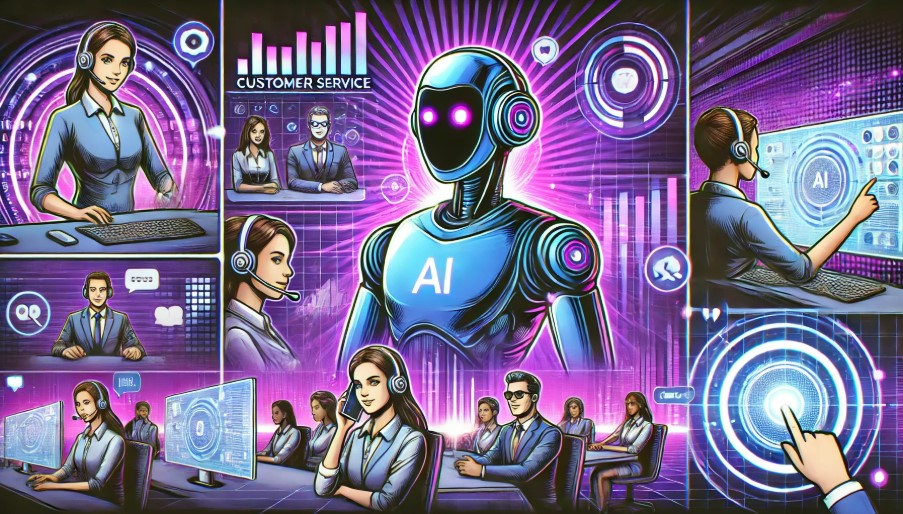AI Customer Service: Transforming Support for the Modern Era
26 Nov 2024 By: Maria Rush
Updated
Understanding AI in Customer Service
AI customer service transforms how businesses engage with customers. It boosts support, simplifies workflows, and improves customer experiences.
Companies now use AI tools to manage tasks like answering questions, solving problems, and giving tailored suggestions.

What is AI? And what is its role in customer service?
AI mimics human intelligence, enabling systems to learn, reason, and solve problems.
In customer service, AI helps companies respond swiftly and streamline support. AI chatbots now serve as first contacts, holding natural conversations that feel human-like. They understand context, give accurate answers, and forward complex issues to human agents. This improves experiences and lets agents handle advanced tasks.
The Evolution of AI in Customer Support
AI customer service has grown from basic automated systems to advanced tools. Today, it analyzes vast data to provide key insights.
This progress boosts response times and improves customer experiences. Machine learning now predicts behavior, helping businesses prevent issues early. Sentiment analysis gauges emotions, enabling tailored responses that enhance satisfaction. These tools improve efficiency and strengthen brand-customer bonds.
Benefits of AI Customer Service
AI profoundly transforms customer service, redefining interactions and boosting satisfaction.
By handling routine tasks, AI lets support teams tackle complex issues, improving efficiency and speeding up resolutions.
Enhancing Customer Experience with AI
Customers today expect quick responses. AI customer service provides instant help through chatbots and virtual assistants , and AI answering services.
These tools improve experiences by offering 24/7 support. They work even when businesses are closed.
AI analyzes data to give personalized solutions. This builds trust and increases customer loyalty, especially when integrated with customer analytics software to refine interactions and predict future customer behavior.
AI systems also learn from interactions. Over time, they predict needs and preferences. For example, they suggest items or deals based on frequent inquiries.
Streamlining Support Processes through AI
AI streamlines internal processes for support teams by automating repetitive tasks. This frees agents to focus on critical issues that need human attention.
For instance, AI triages customer queries. It prioritizes urgent cases, helping teams resolve problems faster.
AI also integrates with existing software. By combining this with AI chatbot development, businesses can automate routine inquiries while maintaining seamless workflows, freeing agents to focus on complex issues. This creates smooth workflows and boosts overall productivity.
In training, AI supports new agents by providing real-time data and insights. It speeds up onboarding and prepares agents for various inquiries.
By analyzing customer interactions, AI identifies common challenges. This enables targeted training to address specific gaps effectively.
Trending Now
AI is transforming customer service by enhancing efficiency, reducing costs, and fostering loyalty. Advanced chatbots handle complex queries, while conversation intelligence resolves issues proactively, cutting call volume and boosting satisfaction. However, many businesses miss AI’s full potential due to poorly defined use cases. Strategic integration focused on effortless experiences can unlock significant ROI. Innovations like natural language understanding (NLU) and generative AI create seamless, frictionless interactions, improving satisfaction and streamlining the customer journey. Aligning AI with a strong CX strategy ensures meaningful value and maximized impact.
Key Features of AI Customer Service

AI offers key features that transform customer service. These tools improve the experience for both customers and support agents.
By understanding these features, businesses can fully leverage AI’s benefits.
Chatbots and Virtual Assistants
Chatbots are a common use of AI. They interact with customers through text or voice.
These bots answer questions, guide users, and share information. They provide 24/7 support for uninterrupted service.
Virtual assistants go further by learning from interactions. Over time, they give smarter, more personalized responses.
For example, they remember past inquiries and preferences. This creates tailored interactions, improving the customer experience.
Personalized service builds stronger brand connections. It fosters loyalty and keeps customers engaged.
Predictive Analytics for Proactive Support
Predictive analytics is a powerful AI tool. It uses past data to predict and prevent customer issues before they happen.
By spotting trends, businesses can solve problems early. This reduces frustration and improves satisfaction.
For example, if a product often fails, companies can alert affected customers in advance. This shows care and avoids negative experiences.
Predictive analytics also helps allocate resources. It identifies peak inquiry times, optimizing staffing to cut wait times.
Anticipating needs creates a smoother service model. It exceeds expectations and strengthens brand reputation.
Overcoming Challenges in Implementing AI for Customer Service
While AI offers many benefits, it also brings challenges. Businesses must tackle these to use AI tools effectively.
Balancing AI with human support is key. Companies must ensure efficient operations without losing the personal touch.
Addressing Data Privacy Concerns
Data privacy is a critical issue in today’s digital age. Businesses must manage customer data responsibly to build and maintain trust.
AI systems process large volumes of data, making transparency vital. Clear communication about data usage prevents backlash.
Establishing strong data handling policies is essential. These policies ensure compliance and protect customer information.
Investing in cybersecurity measures is equally important. Strong security prevents breaches that could harm a company’s reputation.
Regular audits and updates to policies keep them aligned with evolving regulations. This shows a commitment to safeguarding customer privacy.
Ensuring AI and Human Collaboration
The best customer support blends AI with human agents. AI handles simple tasks, while humans tackle complex problems requiring critical thinking.
Training staff to collaborate with AI is crucial. This teamwork boosts efficiency and enhances customer interactions.
Fostering adaptability is essential. Employees should view AI as an ally, not a threat, improving job satisfaction and performance.
AI reduces repetitive tasks, freeing staff to focus on meaningful customer interactions. This shift makes their work more engaging and impactful.
Creating a feedback loop is key. Agents can share insights to improve AI, fostering ownership and teamwork.
Customer feedback also refines AI algorithms. This ensures the system evolves to meet customer needs and expectations.
The Future of AI in Customer Service
The future of AI in customer service is promising. Advancing technology will bring more innovative and effective solutions.
Businesses will depend more on AI to simplify support processes and improve customer experiences.
Emerging AI Technologies in Customer Support
New AI technologies are emerging rapidly. Innovations like natural language processing make interactions feel more human. In order to stay at the forefront of customer service, businesses must consider the range of conversational AI tools available on the market today. To leverage these advancements effectively, understanding what is enterprise AI can help organizations implement large-scale AI solutions that improve efficiency, automate complex tasks, and enhance decision-making across the company.
These tools not only help automate routine processes but also aid in personalizing customer interactions for a better user experience.
With a wealth of options, choosing among the top conversational AI platforms can significantly transform how support teams operate and address consumer inquiries effectively.
These tools help AI understand context and sentiment, leading to smarter responses and improved interactions.
As these technologies advance, they will set new customer service standards. Companies that adapt quickly will stay ahead.
Machine learning also drives progress. AI learns from past interactions, improving over time and delivering personalized experiences.
For example, AI can track frequent inquiries about a product and proactively share updates or recommendations. This boosts engagement and satisfaction.
The Long-term Benefits of AI in Customer Service
Investing in AI brings lasting benefits. It boosts efficiency, reduces costs, and strengthens customer loyalty.
Over time, businesses see better brand reputation and greater customer trust.
AI is more than a trend; it’s essential for modern customer service. Embracing it now ensures long-term rewards.
AI enables 24/7 support, helping businesses serve global audiences without time constraints. This meets customer demands and improves experiences.
It also analyzes vast data to uncover trends and pain points. This insight helps companies refine services and make smarter decisions.
“Artificial intelligence would be the ultimate version of Google. The ultimate search engine that would understand everything on the web. It would understand exactly what you wanted, and it would give you the right thing. We’re nowhere near doing that now. However, we can get incrementally closer to that, and that is basically what we work on.”
—Larry Page
As you consider the transformative power of AI in customer service, remember that HelpSquad is here to bring these advancements to your business. With our cost-effective BPO services, you can experience the benefits of having a bilingual, professional virtual assistant and a dedicated 24/7 customer service team. Starting at just $8.50 per hour, HelpSquad offers the support you need to boost your brand’s efficiency and customer satisfaction. Don’t wait to elevate your customer service experience. Start your trial with HelpSquad today and join the forefront of the modern support era.


